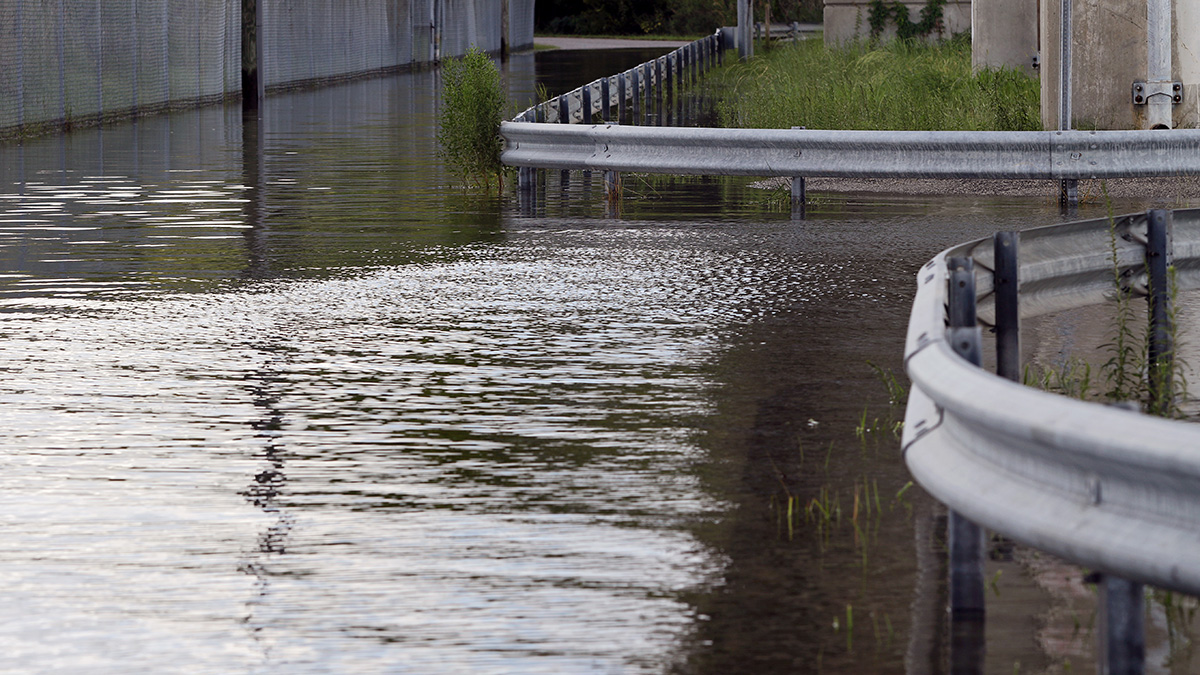
State officials say staff shortages caused by a budget shortfall amid the coronavirus pandemic are making it harder for agencies to respond to sea level rise and other climate change-related issues.
The Virginia Marine Resources Commission has plans to hire a coastal resiliency manager to help handle shoreline management and flooding. But the General Assembly and Gov. Ralph Northam haven’t given VRMC the money to fill the new position.
Other roles at the Department of Conservation and Recreation and Department of Environmental Quality also remain uncreated or unfilled because they haven’t received funding, said Ann Phillips, the special assistant to the governor for coastal adaptation and protection.
As a result, state agencies are struggling to coordinate resilience planning and develop new climate change guidelines.
“There is a need for those positions in those agencies,” Phillips said. “It just slows down the state’s ability to respond.”
Phillips sits on WHRO’s Governing Board of Directors.
The staff shortages are tied to the coronavirus pandemic. Gov. Ralph Northam and the General Assembly approved cuts to several agency positions in April as the pandemic began to slash revenues and public health expenses increased. Northam separately implemented a hiring freeze of state employees.
Virginia now faces a $2.7 billion budget shortfall over the next two years. The General Assembly, which convened for a special session Tuesday, is expected to address the state’s current two-year budget.
In an address to lawmakers to begin the session, Northam proposed new budget revisions to make up for the state’s revenue shortfall. His latest budget still includes cuts for staff positions at VRMC, the Department of Conservation and Recreation and the Department of Environmental Quality.
The governor said he wants to see Virginia’s economic outlook improve before he restores funding to state agencies.
“We all share these priorities, and we will return to them in January, when the time is right,” he said.
Phillips, who specializes in sea level rise, said she understands the funding cuts are necessary right now. She supports the governor's budget.
One of the staffing roles that’s unfilled is the coastal resiliency manager with VRMC. According to the budget, the marine resources commission needs about $78,200 this fiscal year to fill the position.
VMRC has been developing new guidelines and design standards for natural living shorelines, which help protect against storm surge and tidal flooding. Phillips said the resilience specialist will help oversee the new policies and coordinate them with local wetlands boards, the Virginia Institute of Marine Sciences and other state agencies.
At DCR, a dam safety lead engineer and two floodplain management planner positions also sit empty. The department needs nearly $171,000 this fiscal year to hire the engineer and about $230,000 for the management roles.
Russ Baxter, a deputy director with DCR, said floodplain planners assist with state and local resilience and flood-mitigation efforts. They also help localities join the National Flood Insurance Program and serve as a liaison between the state and the Federal Emergency Management Agency.
With limited staff, Baxter said, it’s taking DCR longer to work with localities and manage its other responsibilities.
“You can only do so much with the people that you’ve got,” he said.
The staff shortages come as DCR is responsible for developing Virginia’s new Community Flood Preparedness Fund, which will help localities pay for efforts to adapt to sea level rise. The fund will generate revenue as the commonwealth joins the Regional Greenhouse Gas Initiative — a collaboration of states in the Northeast and Mid-Atlantic that involves capping carbon emissions and then auctioning off credits to carbon emitters.
DCR must write eligibility guidelines for the program and help administer funds to cities once it starts. Baxter said DCR will use money from the greenhouse gas initiative to hire more staff to oversee the preparedness fund.
“We expect to be staffing up as the fiscal conditions allow, moving forward,” Baxter said.
Virginia is already experiencing intensifying rain storms caused by climate change. And the Virginia Institute of Marine Sciences predicts the Hampton Roads region could see more than a foot and a half of sea level rise by 2050.
Phillips noted the staff shortages at the state level are impacting cities’ response to sea level rise and other effects of climate change. In some cases, localities haven’t been able to move forward with new programs because they’re waiting for state guidance.
“It’s frustrating from the point of view of local governments, or planninig districts,” she said. “They work with the state agencies and they’re trying to make progress.”
The staff shortages are another impact of the coronavirus on Virginia's climate change response. Cities have already cut resilience funding and delayed flood mitigation initiatives in response to revenue shortfalls. Norfolk is also at risk of losing federal funding for a massive sea level rise project due to delays caused by the pandemic.
Elizabeth Andrews, director of the Virginia Coastal Policy Center at William & Mary Law School, said the staff shortages are disappointing. She understands the funding cuts for resilience and flooding positions are necessary right now as the state navigates financial stress caused by the pandemic.
But Virginia has historically underfunded climate change initiatives. And Andrews said the cuts are another example of the state looking at climate change as a future issue.
“It’s a pressing problem and we’ve got to deal with it...and make it a today problem,” she said.




